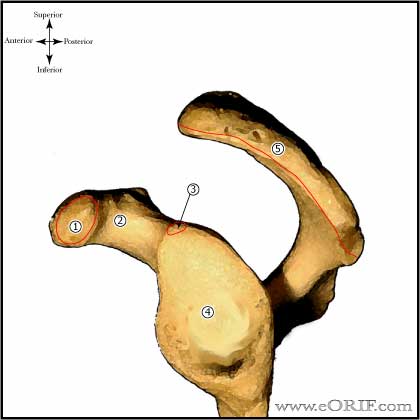 |
Scapula - Lateral View
- Coracobrachialis and Biceps (short head)
- Coracoid process
- Supraglenoid tubercle - Biceps (long head)
- Glenoid
- Deltoid origin on acromion
|
Glenoid Anatomy
- Articular surface is concave. The hyaline cartilage covering the glenoid is thicker toward the periphery and thinner in the center.
- Glenoid inclination is variable, but averages @4.25 degrees superior (range -7 to 15.8) (Churchill RS, JSES 2001;10:327)
- Glenoid version averages 1.23 degrees of retroversion (Churchill RS, JSES 2001;10:327)
- Glenoid width averages 28.8 +/- 1.6mm in males and 23.6 +/- 1.5mm in females. (Churchill RS, JSES 2001;10:327)
- Glenoid height averages 37.5 +/- 2.2mm in males and 32.6 +/- 1.8mm in females. (Churchill RS, JSES 2001;10:327)
- Radius of curvature of the glenoid in the coronal plane averages 2.3mm greater than that of the humeral head, but because the cartilage is thinner in the center of the glenoid with radius of curvature for the glenoid and humeral head including their cartilage surfaces is nearly equal.
- Vascularity: (Cooper DE, JBJS 1992;74A:46).
|
|
|

|
Glenoid Articular Surface
- Articular surface is concave. The hyaline cartilage covering the glenoid is thicker toward the periphery and thinner in the center.
- Glenoid (normal)
- Bare area of glenoid, normal
- Humeral Head
- Anterior Labrum
Arthroscopic view from posterior portal, beach chair position.
|
|
Glenoid Morphology in OA
- Type A1: centered humeral head with minor erosion of the glenoid and loads equally distributed:
- Type A2: centered humeral head with major central erosion of the glenoid and loads equally distributed:
- Type B1: asymmetric distribution of loads with posterior subluxation of the humeral head, narrowing of the posterior joint space, subchondral sclerosis, and osteophytes:
- Type B2: asymmetric distribution of loads with posterior subluxation of the humeral head and a biconcave glenoid
- Type C: dysplastic glenoid with >25° associated retroversion and a centered or slightly subluxated head: :
Walch G, J Arthroplasty 1999;14:756
|
|

